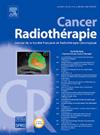Specific radiosensitivity of brain structures (areas or regions) and cognitive impairment after focal or whole brain radiotherapy: A review
IF 1.4
4区 医学
Q4 ONCOLOGY
引用次数: 0
Abstract
Delayed neurocognitive impairment is observed following encephalic radiotherapy, including brain parts (areas), leading to a substantial deterioration of the quality of life. These delayed radiotherapy side effects are variable in terms of intensity of symptoms and time of occurrence, characterized by minor-to-severe cognitive deficits, such as attention or memory disorders and/or dysexecutive syndrome. However, the precise mechanisms leading to these cognitive disorders remain mostly unknown. Various tissue alterations have been reported after brain radiotherapy, in specific brain structures as the hippocampus, the cerebral white matter or the cerebral cortex. Sparing these structures during brain radiotherapy may be a potential approach to limit the development of late cognitive impairment; however, few dose constraints have been published regarding brain areas (regions) involved in cognitive functions. The main purposes of this literature review are to report the pathophysiological process leading to the radiation-induced cognitive impairment, to describe the tolerance and radiological modifications induced by radiation of specific healthy cerebral tissues, to better understand their radiosensitivity and to describe potential improvements.
局部或全脑放疗后脑结构(区域或区域)和认知损伤的特异性放射敏感性:综述
脑放射治疗后观察到迟发性神经认知障碍,包括脑部分(区域),导致生活质量的严重恶化。这些延迟放疗副作用在症状的强度和发生时间方面是可变的,其特征是轻微到严重的认知缺陷,如注意力或记忆障碍和/或执行障碍综合征。然而,导致这些认知障碍的确切机制仍然是未知的。据报道,在脑放疗后,在海马、脑白质或大脑皮层等特定脑结构中出现了各种组织改变。在脑放射治疗期间保留这些结构可能是限制晚期认知障碍发展的潜在方法;然而,关于涉及认知功能的脑区(区域)的剂量限制很少发表。本文献综述的主要目的是报道导致辐射诱导的认知障碍的病理生理过程,描述特定健康脑组织在辐射诱导下的耐受性和放射学改变,以更好地了解其放射敏感性并描述潜在的改善。
本文章由计算机程序翻译,如有差异,请以英文原文为准。
求助全文
约1分钟内获得全文
求助全文
来源期刊

Cancer Radiotherapie
医学-核医学
CiteScore
2.20
自引率
23.10%
发文量
129
审稿时长
63 days
期刊介绍:
Cancer/radiothérapie se veut d''abord et avant tout un organe francophone de publication des travaux de recherche en radiothérapie. La revue a pour objectif de diffuser les informations majeures sur les travaux de recherche en cancérologie et tout ce qui touche de près ou de loin au traitement du cancer par les radiations : technologie, radiophysique, radiobiologie et radiothérapie clinique.
 求助内容:
求助内容: 应助结果提醒方式:
应助结果提醒方式:


